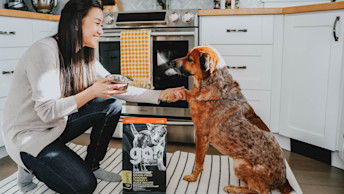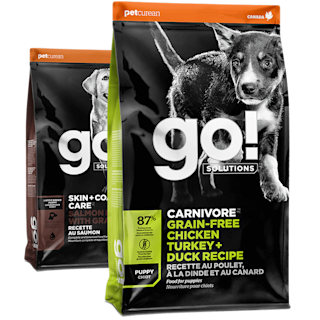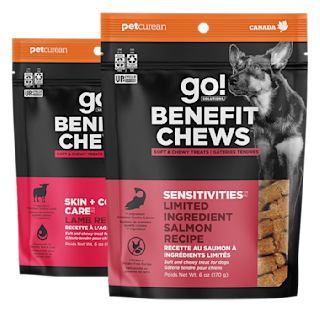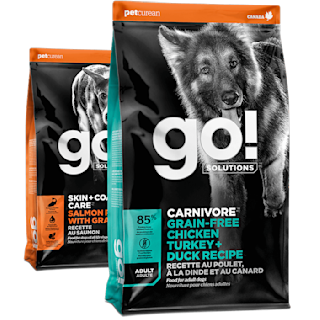July 14, 2022
When to Switch from Puppy Food to Adult Food

We all wish that our furry friends could stay puppies forever; however, they eventually grow into adults, and as a result, will have to switch from a puppy-specific recipe to an adult recipe. But when do I switch from puppy food to adult food? Keep reading to find out how to support your pup’s nutritional needs throughout these different life stages!
Why Choose a Puppy-Specific Recipe?
Have you ever wondered why there are puppy foods and adult dog foods? Or why you can’t feed a puppy like an adult dog? The nutritional requirements of growing puppies are actually different from those of adult dogs, so their diets should be too!
A puppy’s diet plays a key role in supporting their growth and development. Because of this, a puppy diet must consider several important factors, including their immature immunity, digestion, and teeth development, along with their growth and development requirements.

Recommended Solution
Expert-Formulated Kibble for Growing Puppies
Formulated by pet nutrition experts to support your puppy’s healthy development. Made with quality animal proteins to support growing muscles, and probiotics to help promote healthy digestion.
View puppy food
How Much Do I Feed My Puppy and How Often?
Pick a puppy diet? Check! Next? How much do I feed my pup, and how often?
The amount of food you feed will vary depending on your pet’s breed, activity level, age, and climate. Use the feeding guidelines on the back of the food bag as a guide, adjusting the quantity fed to achieve your dog’s ideal weight as they grow.
In addition, puppies do not know how to regulate their food intake, so it’s up to you to control their portions to help avoid them becoming overweight. It's usually recommended to feed 3 to 4 meals per day. Once your pup is 6 months of age, switching to two feedings a day is recommended.
Remember that the quantity stated on the feeding guidelines is a daily recommended amount, so you’ll need to split this across your puppy’s meals.
Any treats you give your puppy should also be included in their daily amount too. It is easy to overfeed with rewards, so adjusting their food intake is crucial to maintaining a healthy body weight. You can even use one of their meals as training time and using the kibble pieces as a reward.

Recommended Solution
Healthy Soft Dog Treats for Snacking or Training
Indulge your pup's cravings while supporting their good health with Benefit Chews soft dog treats. Our chewy dog treats are expertly formulated to provide functional nutrition in an irresistibly tasty bite.
View dog treats
When to Switch from Puppy Food to Adult Food
After your puppy is approximately one year old you can make the switch to an adult recipe. However, this can vary based on breed size – large breed puppies typically consume a puppy diet for a bit longer due to their increased length of growth stage, around 15-24 months before making the switch.
Making the switch to an adult dog food is important because puppy foods are generally higher in calories to accommodate all that puppy energy and development.
As an adult, these excess calories can cause weight gain when fed longer than intended. Check with your veterinarian to help determine when your puppy is ready to move onto adult food.

When your puppy is ready to transition to their new adult dog food, it is important to make the switch gradually to avoid any digestive upset.

Recommended Solution
Adult Dog Food for Your Dog's Unique Dietary Needs
Our adult dog food recipes are expertly formulated with premium-quality proteins and antioxidant-rich fruits and veggies to support the good health of your canine companion.
View adult dog food
Pro Tip: Mix It Up with Combination Feeding
Do you still have mixed feelings on how to feed your pup? Try mixed feeding! Mixed feeding or combination feeding is when you give your puppy a combination of wet and dry food – either at the same time or at separate meals. They both offer important benefits:
Hydration: In dry foods, the moisture significantly lower than that of wet food. This is an easy way to ensure your pup is staying hydrated and healthy!
Palatability: Wet food formulas are often highly appealing to even the pickiest of pets!
Don’t FUR-get to ensure that you are feeding your pup the right amount of wet food – use the instructions on the package as a guide and adjust accordingly. You can also consult your veterinarian to ensure that your pet is receiving the proper portions of both wet and dry food.
In Conclusion
Deciding the best way to feed your pet can be ruff, especially through these important life-stages; but follow these steps to support your dog’s growth and development and watch them grow into a strong and healthy adult dog!


